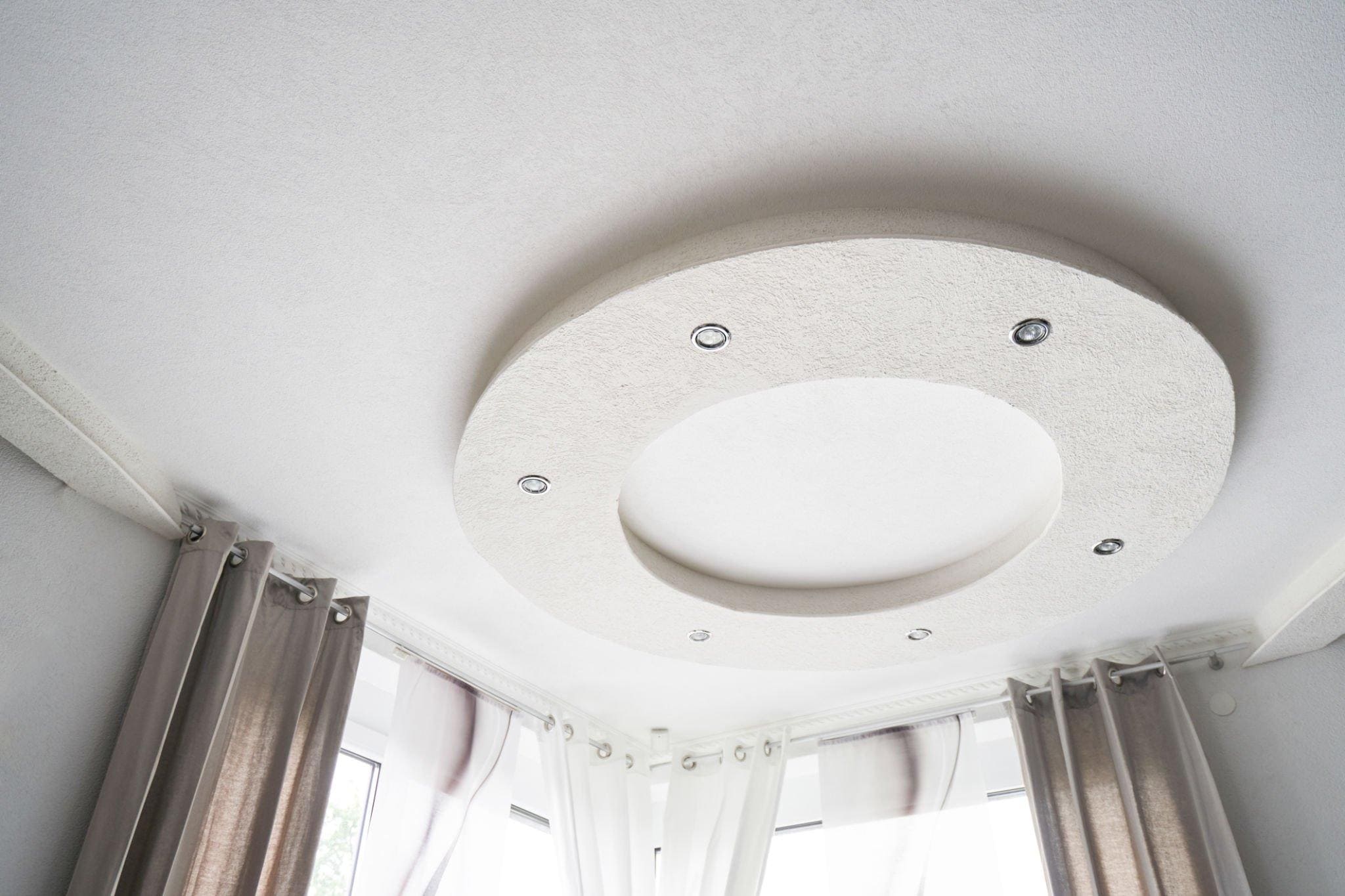
Spotlights for plasterboard ceilings: stylish light
Drywall, as a unique material used for the construction of ceilings, has changed the approaches to lighting in such rooms. This is caused not only by technical requirements, but also by the features of modern design, in which lighting becomes its complementary part. If previously one light source was selected, now spotlights for plasterboard ceilings are located around the perimeter of the room. There are many obvious positive aspects in such a system.
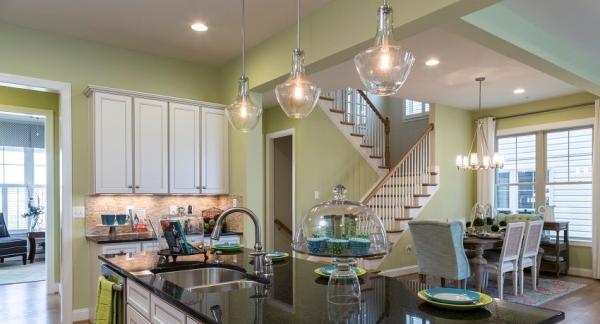
The lamps can be placed at any point of the plasterboard ceiling
Advantages of spot lighting devices
Freedom of choice of fixtures and their installation options. The range of lighting devices that are offered on the modern market allows you to use suspended, overhead or recessed lamps. The installation of point light sources allows you to flexibly choose options for expanding the space, as well as use various ways to decorate rooms with the help of illuminating means. A creative approach, unlimited by conventions, judging by the photos of plasterboard ceilings with lighting, allows you to make the room unique and inimitable.
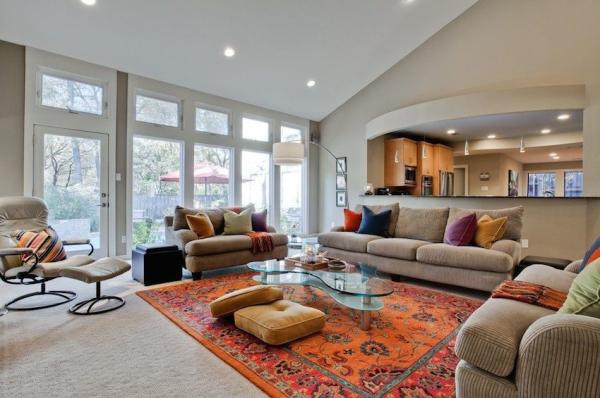
Spotlights on the sloping ceiling in the living room
Convenience of installation work. Even a layman can equip a lighting system in the room. If a person has at least some knowledge about electrical installation and safety rules, it is really possible to do it yourself.
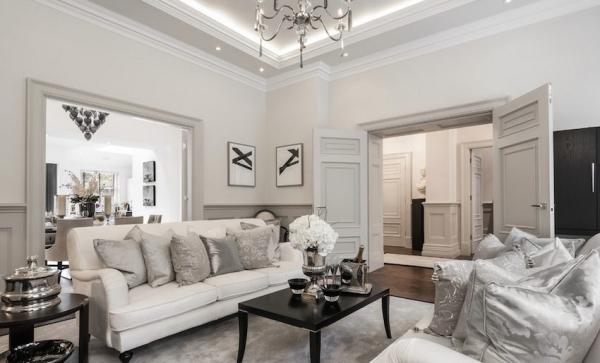
Combination of chandelier and spotlights
The benefit of using. Despite the fact that several lighting sources are installed, they all have low power, which together gives more savings than one or two powerful electric lamps. With the correct distribution of light streams, it will be used in a uniform, rational and effective degree.
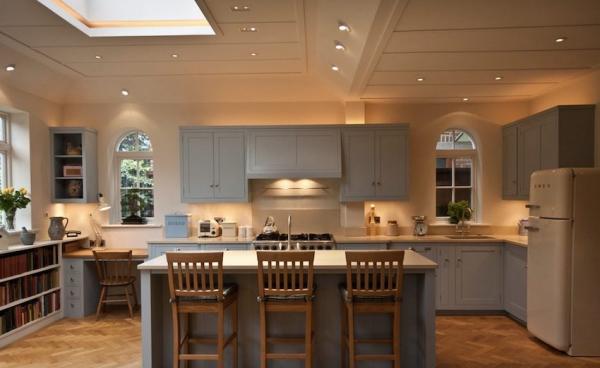
LED lights on the ceiling in the kitchen
Spotlights for plasterboard ceilings: types
Modern production of electrical products offers several types of lighting devices, from which you can choose different stylistics and content options for creating a lighting system. This list contains the following devices:
- suspended type chandeliers;
- overhead lamps;
- fluorescent lamps;
- rotary or stationary point;
- ribbon LEDs.
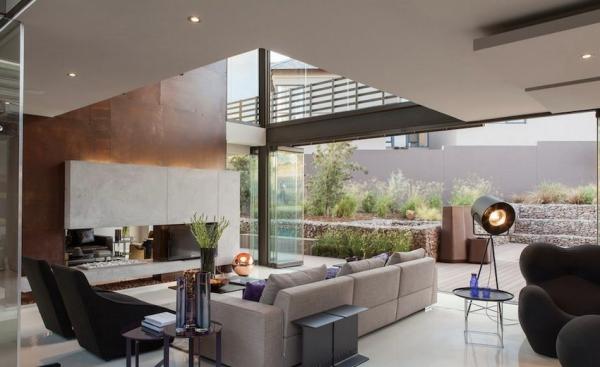
Spot lighting in a two-level living room
A chandelier, as a traditional element of lighting systems, does not always fit into the exposure of a plasterboard ceiling. This is mainly because the level of such a ceiling is visually lowered. Therefore, a chandelier on the example of a photo of plasterboard ceilings with illumination can be used in rooms where there is enough space for it. And also in rooms where a combined method of placing lighting devices is used.
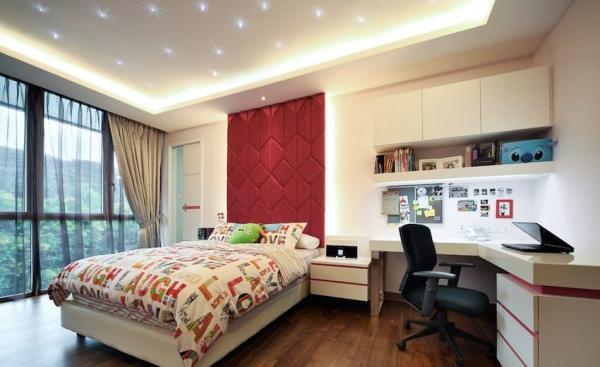
Combination of spot and diffused light in the bedroom
The chandelier can be attached in two ways: to pre-prepared special profiles, or to the base of the ceiling. It is not recommended to attach a lamp of any kind to a drywall base. But if it is not fundamentally important to place a chandelier, it is better to use any other type of lamps. The ceiling will look harmonious and modern.
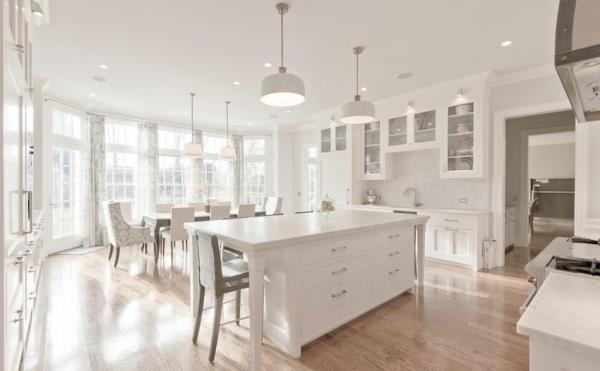
A perfect combination of hanging and spotlights
Plasterboard ceiling with illumination with spotlights
These are very neat and compact products. There are certain rules for installing such lamps in order to get the maximum benefit from their use. This indicator depends on the height of the ceilings and is determined by the distance between the devices. But the distance between them should not exceed one meter if there are no other types of lighting devices in the room.
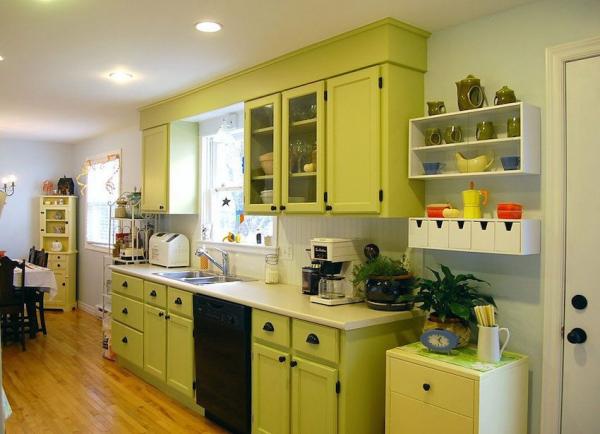
Large LED lights on the kitchen ceiling
How to choose lamps for chandeliers and spotlights for plasterboard ceilings
There are no restrictions among the lamps that can be used for ceilings. Usually they depend on the size of the lamp. These can be ordinary incandescent, halogen or LED bulbs. For plasterboard ceilings, it is recommended to use halogen.
They are durable and economical, do not emit much heat. But to use them, it is necessary to connect a transformer device. This is because the mains voltage is 220 V, and the halogen bulb is designed for 12. There are also 220-volt “halogens”, but their service life is shorter.
Remember! Wiring and light bulbs must be provided with fire protection.
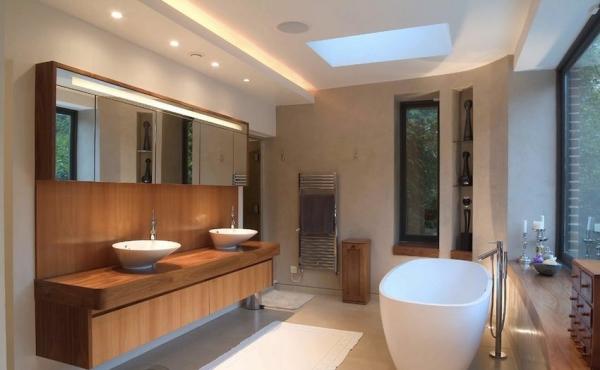
Spotlights serve as an excellent source of additional bathroom lighting
Lamp protection
When choosing a device and its location, you should pay attention to the protection from external influences. Dust and moisture pose a direct threat to the lamps. On the marking of the devices, you can determine the degree of their security by the first two digits. One of them indicates the maximum size of the elements that can penetrate into the device, the other – the degree of protection from moisture.
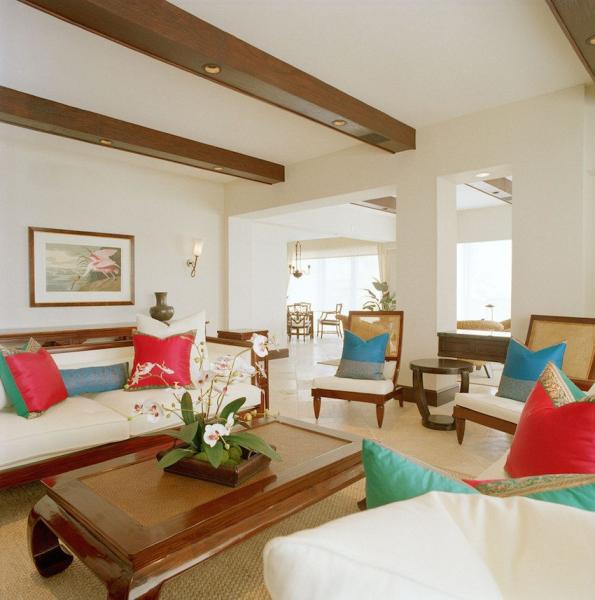
The lamps are built into false balusters
Dust protection system
This indicator may mean that the lamp is protected from ingress of particles with a maximum size of 50; 12; 2.5; 1 mm. These indicators have a numerical designation from 1 to 4, respectively. Codes 5 and 6 contain information that the device is partially or completely protected from dust ingress. If the marking of the lamp starts from scratch, it means that there is no dust protection in it.
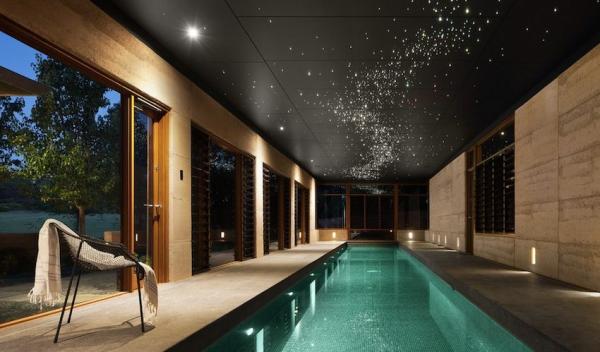
For rooms with high humidity, the lamps must have moisture protection
Protection from moisture
In the product marking, the number 1 means that the lamp is protected from drops falling in the vertical direction, 2 – at an angle of 15°, 3 – at an angle of 60°, 4 – from splashes falling on the lamp in any direction, 5 – the lamp is protected from a jet, 6 – a strong jet, 7 – short-term immersion, 8 – long immersion, 0 – no moisture protection.
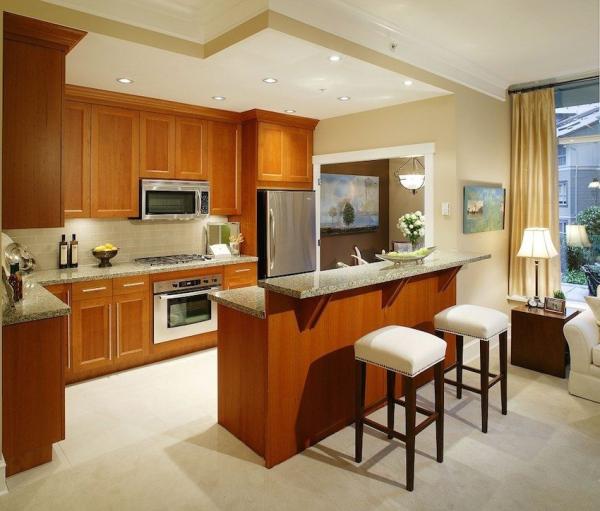
In rooms with low ceilings, built-in lamps are indispensable
Preparatory activities
Before installing fixtures on plasterboard ceilings, it is necessary to carry out marking. This takes into account the number of tiers, if the structure is multilevel, as well as the distance from the walls to the place where the frame fasteners will be installed. The location of the profile and the lamps should not match.
Attention! Electrical installation is done before the installation of drywall.
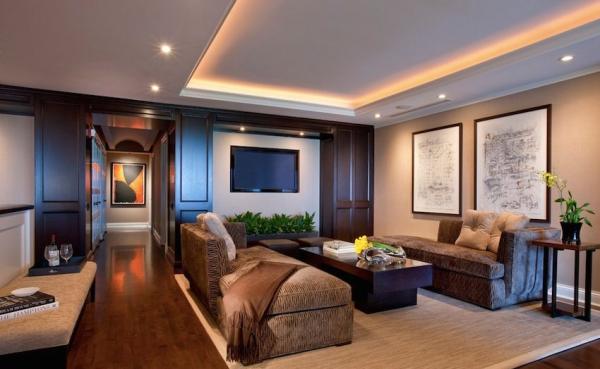
A perfect combination of diffuse and spot lighting of the living room
Wiring distribution
The cable is attached to the structural elements, but not tightly. A 15-centimeter loop is formed at the place where the lamp will be placed. The wire is conducted in a certain sequence from the first to the last element of the circuit. After the electrical installation activities are completed, you can start sheathing the ceiling with sheets of drywall, as well as finishing.
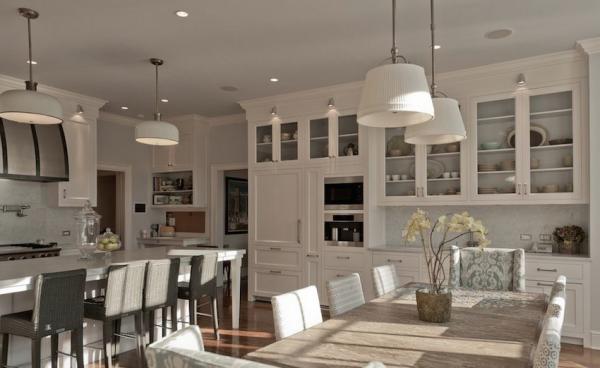
The combination of different types of lighting is very convenient
Important! The wiring must be completely uniform: only made of aluminum or copper. Otherwise, it may cause the cables to catch fire.
There is another option for conducting cables. It implies the connection of each lamp autonomously. To ensure safety, each wire is placed in a special corrugated pipe made of non-combustible material. In order for the holes in the drywall to coincide with the mounting points of the lamps, it is necessary to know the exact diameter of the device. It is indicated on the product packaging. It will be more convenient and more accurate if you make a hole with the help of special crown nozzles on the drill.
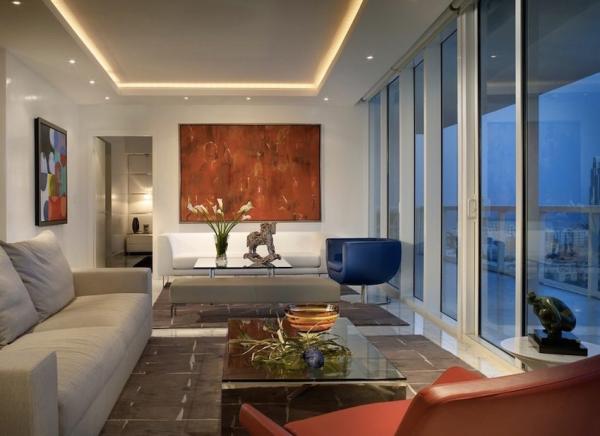
Spot lighting visually makes the ceiling higher
Conclusion
The organization of lighting on plasterboard floors is not a complicated process. You can handle it yourself, but it is important to remember two rules. First: it is necessary to observe an interval of no more than 1 m between the lamps. Second: you need to use the average power of the bulbs to avoid overheating of the ceiling and the system.
For those who may not feel confident in their ability to handle the lighting installation themselves, it’s advisable to seek assistance from a professional renovation company. Such companies have the expertise and experience to ensure that your floor remodeling project, including lighting installation on plasterboard floors, is executed flawlessly. They can guide you through the process, select the right lighting fixtures, and guarantee a well-lit and aesthetically pleasing result for your renovated space.
In conclusion, when embarking on a floor remodeling project, whether as a DIY enthusiast or with the assistance of a renovation company, remember the importance of proper lighting installation. Adhering to the rules of spacing and using appropriate bulb wattage will not only enhance the visual appeal of your space but also ensure its safety and longevity.


